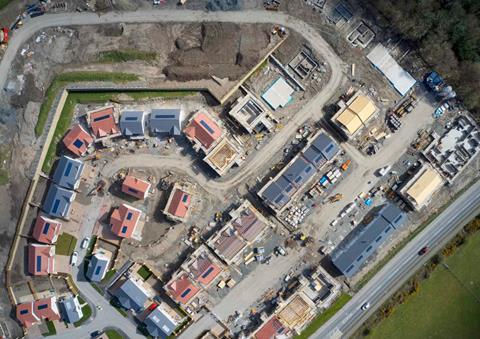The survey by SEC Newgate has been conducted this year for the first time since before the pandemic
The planning system in England and Wales is “incapable of providing the homes needed to tackle the housing crisis,” according to the findings of an industry survey.
The National Planning Barometer of 311 planning committee members conducted by SEC Newgate reveals that the planning system is “riven with internal systemic issues” that are impacting on the delivery of UK housing.

The survey reveals planning committee members feel the national housing crisis is significantly worse than it was pre-pandemic, when the barometer was last conducted. In 2023, 67% of respondents said the housing crisis was getting worse, compared with 27% in 2020.
More than half (56%) of planning committee members feel the housing crisis is “highly severe” in 2023 – up from 25% in 2020.
The results suggest providing affordable homes for future generations is a clear priority for local authorities, with 68% selecting this as a top three priority for their local authority over other priorities such as economic growth (53%), and supporting thriving town centres (39%).
“The National Planning Barometer reveals the planning system is in the eye of a perfect storm,” Perry Miller, head of advocacy local, SEC Newgate, said in a statement.
“Riven by systemic internal issues, combative in nature, and facing an acute lack of resources, the planning system is incapable of providing the homes needed to tackle the housing crisis, which is widely acknowledged to be increasingly severe.
He adds: “Frequent national policy changes only exacerbate the pressures and create further contradictions and conflict. The situation is bleak and requires urgent action if the housing crisis is not to get even worse.”
Prioritising delivering on the government’s housing targets ranks is in decline, with 17% of councillors selecting this as a top three priority in 2020 compared to just 12% in 2023.
The barometer also showed an increasing focus among local planning authorities on sustainability when considering planning applications.
>>See also: Gove sets out plans for new urban quarter in Cambridge in regeneration strategy
Almost all (92%) of respondents said the sustainability of a scheme was a factor to consider when determining an application — and 36% said it was an absolute priority.
Sustainability is starting to be a reason for voting against officers’ recommendations: 9% of those who voted against recommendations cited sustainability or environmental concerns.
Protecting the environment and clean streets has doubled as a local priority at 46% in 2023 compared with 23% in 2020.
The survey revealed that nine out of 10 respondents have voted against their planning officers’ advice at least once in the past year, with almost a fifth doing so six or more times.
Councillors cited frequent changes to national planning policy as exerting huge and unrealistic external pressures on local housing decision-making, with the top desired reform to planning law ‘reducing central government’s role in local planning’.
Only two out of 10 councillors feel positive about the impact of future planning policies such as the government’s Levelling Up and Regeneration Bill, and updates to the National Planning Policy Framework, according to the latest barometer.










No comments yet